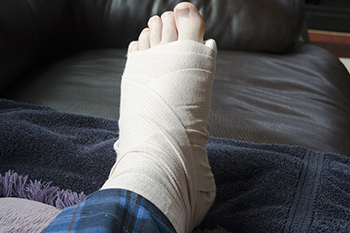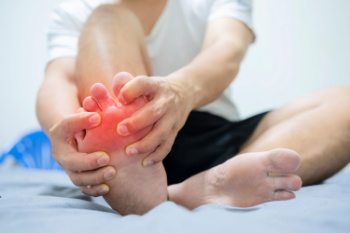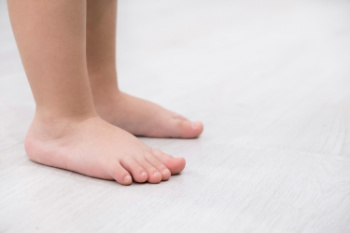Connect With Us
Blog
Items filtered by date: March 2024
Types of Metatarsal Foot Fractures

Metatarsal fractures encompass a variety of injuries, from acute trauma to stress fractures in the five long bones of the feet. Acute metatarsal fractures occur suddenly, often due to forceful impact, like dropping a heavy object on it or sports-related incidents. These fractures can be open, where the skin is broken, or closed, and may be displaced, requiring realignment and stabilization by a podiatrist. The fifth metatarsal bone is particularly prone to acute fractures, commonly occurring at various points along its length. Stress fractures, on the other hand, develop gradually from repetitive pounding, resulting in hairline cracks that may be difficult to detect. However, they still require proper diagnosis and treatment to prevent worsening symptoms. Recognizing the signs of metatarsal fractures and seeking timely medical attention from a podiatrist is important. If you suspect a metatarsal fracture or experience midfoot pain it is suggested that you make an appointment with a podiatrist for an exam, diagnosis, and treatment options.
A broken foot requires immediate medical attention and treatment. If you need your feet checked, contact one of our podiatrists from Comprehensive Foot & Ankle Center. Our doctors can provide the care you need to keep you pain-free and on your feet.
Broken Foot Causes, Symptoms, and Treatment
A broken foot is caused by one of the bones in the foot typically breaking when bended, crushed, or stretched beyond its natural capabilities. Usually the location of the fracture indicates how the break occurred, whether it was through an object, fall, or any other type of injury.
Common Symptoms of Broken Feet:
- Bruising
- Pain
- Redness
- Swelling
- Blue in color
- Numbness
- Cold
- Misshapen
- Cuts
- Deformities
Those that suspect they have a broken foot shoot seek urgent medical attention where a medical professional could diagnose the severity.
Treatment for broken bones varies depending on the cause, severity and location. Some will require the use of splints, casts or crutches while others could even involve surgery to repair the broken bones. Personal care includes the use of ice and keeping the foot stabilized and elevated.
If you have any questions please feel free to contact our offices located in Lehigh Ave and Nazareth Hospital in Philadelphia, Collegeville Darby, and Langhorne, PA . We offer the newest diagnostic and treatment technologies for all your foot and ankle needs.
What Is Ainhum and How Podiatrists Can Help?

Ainhum is a rare condition characterized by the spontaneous development of a constricting band around the base of the fifth toe. This can lead to progressive constriction, tissue loss, and eventual auto-amputation if left untreated. Podiatrists play a vital role in diagnosing and managing ainhum. They can provide early intervention by carefully monitoring the condition and relieving pressure on the affected toe. These foot doctors can offer treatments, such as surgical release of the constricting band or orthotic devices to alleviate discomfort and prevent further tissue damage. Podiatrists also can educate patients about proper foot care techniques and regular monitoring to detect any changes in the condition early on. If you notice a ring around one of your toes with a squeezing sensation, it is strongly suggested that you make an appointment with a podiatrist for a timely diagnosis and immediate treatment.
Some foot conditions may require additional professional care. If you have any concerns, contact one of our podiatrists of Comprehensive Foot & Ankle Center. Our doctors can provide the care you need to keep you pain-free and on your feet.
Rare Foot Conditions
The majority of foot conditions are common and can be treated by a podiatrist. Standard diagnostic procedures are generally used to identify specific conditions and treatment can be rendered. A podiatrist also treats rare foot conditions which can be difficult to diagnose and may need extra attention and care.
There are many rare foot conditions that can affect children. Some of these can include:
- Freiberg’s disease
- Kohler’s disease
- Maffucci syndrome
Freiberg’s disease - This can be seen as a deterioration and flattening of a metatarsal bone that exists in the ball of the foot. It typically affects pre-teen and teenage girls, but can affect anyone at any age. Symptoms that can accompany this can be swelling, stiffness, and the patient may limp.
Kohler’s disease - This often targets the bone in the arch of the foot and affects younger boys. It can lead to an interruption of the blood supply which ultimately can lead to bone deterioration. The patient may limp or experience tenderness, swelling, and redness.
Maffucci syndrome - This affects the long bones in a child’s foot leading to the development of abnormal bone lesions. They are benign growths and typically develop in early childhood and the bones may be susceptible to breaking.
A podiatrist can properly diagnose and treat all types of rare foot conditions. If your child is affected by any of these symptoms or conditions, please don’t hesitate to call our office so the correct treatment method can begin.
If you have any questions please feel free to contact our offices located in Lehigh Ave and Nazareth Hospital in Philadelphia, Collegeville Darby, and Langhorne, PA . We offer the newest diagnostic tools and technology to treat your foot and ankle needs.
See Your Podiatrist Regularly If You Work On Your Feet
Understanding Foot Changes During Pregnancy

Pregnancy is a transformative journey marked by numerous bodily changes, including those affecting the feet. As the body undergoes hormonal shifts and weight gain, the feet bear the brunt of these transformations, often resulting in the development of various foot conditions. Swelling, or edema, is a common occurrence due to fluid retention, causing the feet to appear puffy and uncomfortable. Additionally, the increased pressure on the arches may lead to the onset or exacerbation of conditions such as plantar fasciitis or flat feet. Hormonal changes can also impact ligaments and joints, potentially causing instability and discomfort in the ankles and feet. To mitigate these issues, pregnant individuals are advised to wear supportive footwear, elevate their feet when possible, and engage in gentle exercises to improve circulation and alleviate swelling. If you have developed foot conditions during your pregnancy, it is suggested that you schedule an appointment with a podiatrist who can guide you toward finding relief.
Pregnant women with swollen feet can be treated with a variety of different methods that are readily available. For more information about other cures for swollen feet during pregnancy, consult with one of our podiatrists from Comprehensive Foot & Ankle Center. Our doctors will attend to all of your foot and ankle needs.
What Foot Problems Can Arise During Pregnancy?
One problem that can occur is overpronation, which occurs when the arch of the foot flattens and tends to roll inward. This can cause pain and discomfort in your heels while you’re walking or even just standing up, trying to support your baby.
Another problem is edema, or swelling in the extremities. This often affects the feet during pregnancy but tends to occur in the later stages.
How Can I Keep My Feet Healthy During Pregnancy?
- Wearing orthotics can provide extra support for the feet and help distribute weight evenly
- Minimize the amount of time spent walking barefoot
- Wear shoes with good arch support
- Wear shoes that allow for good circulation to the feet
- Elevate feet if you experience swelling
- Massage your feet
- Get regular, light exercise, such as walking, to promote blood circulation to the feet
If you have any questions please feel free to contact our offices located in Lehigh Ave and Nazareth Hospital in Philadelphia, Collegeville Darby, and Langhorne, PA . We offer the newest diagnostic and treatment technologies for all your foot and ankle needs.
Are My Child’s Flat Feet a Problem?
 Flat feet in children are a common condition and can be a normal part of a child's development. The arch of a child’s foot may not fully develop until later in childhood, so flat feet often resolve on their own as the child grows. However, some cases of flat feet persist, which can cause an older child heel and arch pain. This can worsen during activities like playing sports and running. Flat feet can be associated with other conditions, such as tendon inflammation or joint problems. There are treatment options for flat feet that cause pain, and discomfort, and affect a child's ability to participate in physical activities. If your child has flat feet, it is suggested you make an appointment with a podiatrist who can address any potential issues and assess your child’s foot development.
Flat feet in children are a common condition and can be a normal part of a child's development. The arch of a child’s foot may not fully develop until later in childhood, so flat feet often resolve on their own as the child grows. However, some cases of flat feet persist, which can cause an older child heel and arch pain. This can worsen during activities like playing sports and running. Flat feet can be associated with other conditions, such as tendon inflammation or joint problems. There are treatment options for flat feet that cause pain, and discomfort, and affect a child's ability to participate in physical activities. If your child has flat feet, it is suggested you make an appointment with a podiatrist who can address any potential issues and assess your child’s foot development.
Flatfoot is a condition many people suffer from. If you have flat feet, contact one of our podiatrists from Comprehensive Foot & Ankle Center. Our doctors will treat your foot and ankle needs.
What Are Flat Feet?
Flatfoot is a condition in which the arch of the foot is depressed and the sole of the foot is almost completely in contact with the ground. About 20-30% of the population generally has flat feet because their arches never formed during growth.
Conditions & Problems:
Having flat feet makes it difficult to run or walk because of the stress placed on the ankles.
Alignment – The general alignment of your legs can be disrupted, because the ankles move inward which can cause major discomfort.
Knees – If you have complications with your knees, flat feet can be a contributor to arthritis in that area.
Symptoms
- Pain around the heel or arch area
- Trouble standing on the tip toe
- Swelling around the inside of the ankle
- Flat look to one or both feet
- Having your shoes feel uneven when worn
Treatment
If you are experiencing pain and stress on the foot you may weaken the posterior tibial tendon, which runs around the inside of the ankle.
If you have any questions please feel free to contact our offices located in Lehigh Ave and Nazareth Hospital in Philadelphia, Collegeville Darby, and Langhorne, PA . We offer the newest diagnostic and treatment technologies for all your foot and ankle needs.

